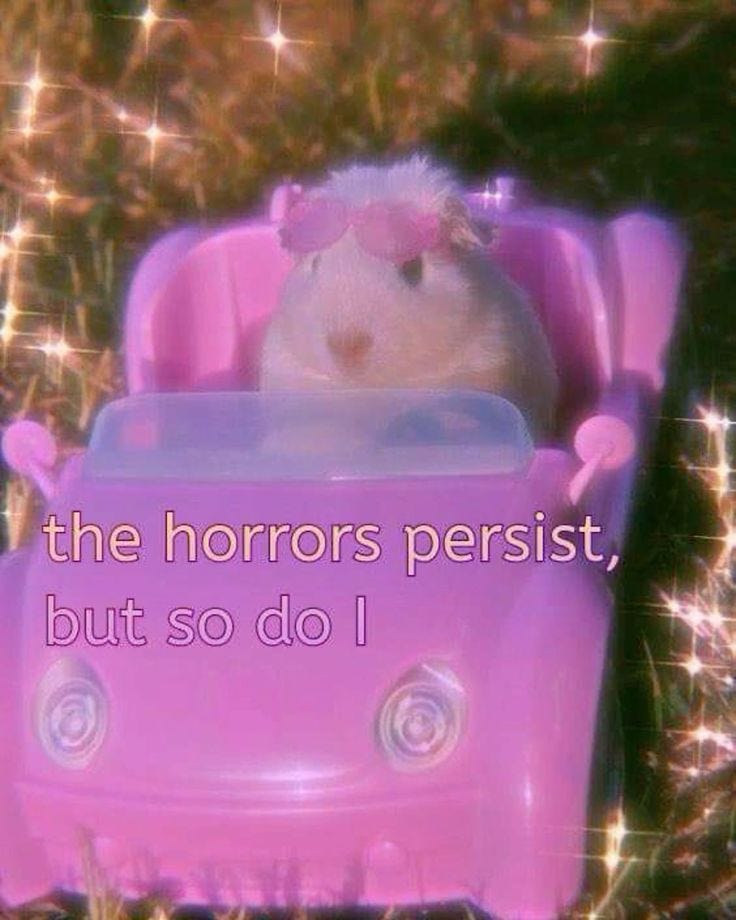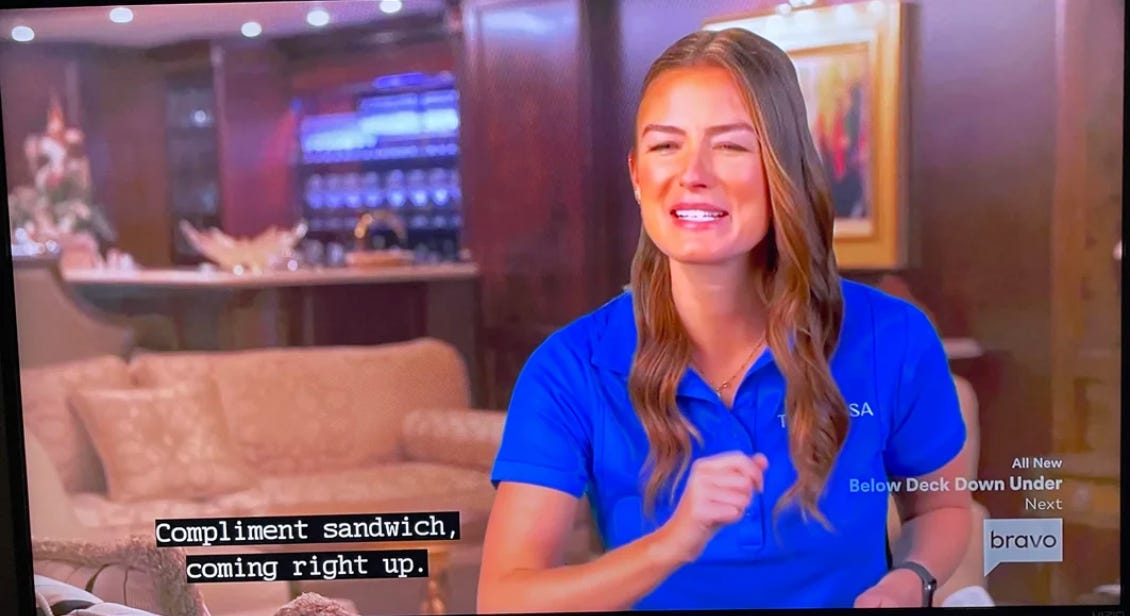nobody wants to work hard for an asshole
some of the best lessons in life really do come from watching reality tv
while deep-frying fish before our nye dinner guests arrived, my boyfriend blurted out: “the best work advice i heard this year is from aesha on below deck down under: ‘nobody wants to work hard for an asshole.’” this sparked a 30-minute ping pong match of anecdotes from his industry (restaurants) and mine (marketing/corporate) proving it’s not an industry-specific issue.
we’ve all likely encountered these deeply insecure people who, having been treated poorly in their past work lives, feel they’ve earned the right to continue this behavior with those they manage.
this archetype is particularly prominent in my boyfriend’s industry: chefs. carmen from the bear encapsulates this well—he’s a product of generational trauma passed down from other chefs. despite his best efforts, he struggles to break the cycle under the relentless stress of the kitchen.
bringing it back to where this thought spawned, in below deck down under (yes, this was mine and my boyfriend’s christmas binge series, hence forcing yet another reference), chief stew aesha anxiously anticipates the arrival of the new chef. during their initial conversation, she nervously asks, “do you have little tantrums and stuff?” only for him to dismissively respond “just don’t be stupid”. however, as the season unfolds, he repeatedly displays “little tantrums” all while continuing to wear the asshole label like its a badge of honour. karma catches up with him towards the end, foreshadowing the universal truth: assholes never win in the long run.
in recent years, the masks of many once-beloved celebrities and zeitgeist brand founders have slipped. these “icons,” if you will, projected the illusion of having it all together whilst mistreating their employees behind the scenes. think of lizzo, ellen degeneres, yael aflalo (founder of reformation), and most recently, matilda djerf.
my first big-girl job was in fashion pr. i was 21, fresh out of uni, and already developing imposter syndrome having been given the role of “dutch market coordinator” despite not knowing any dutch. i remember my then-manager doing a meet-and-greet introduction at everybody’s desks. there was one girl on my team who i noticed was instantly cold toward me. long story short, she made my life miserable for the two years i was working there. a few weeks before i handed in my notice, she got drunk and told me she never liked me because i didn’t shake her hand when i first introduced myself (pre-corporate me probably gave her an insecure “hiii” & wave).
that job gave me a sharp “asshole” radar, which was only later reinforced by being handed a clearly under-qualified freelance interim manager who made her insecurities my problem to solve. i was done. i was no longer motivated by whether a brand felt “cool” enough to be on my cv; i knew that if i was going to survive a corporate environment again, i needed to work with good people.
when i moved from fashion to tech, i was determined to avoid toxic team environments. during interviews, i scrutinised team morale and decoded phrases like “work hard, play hard.” thankfully, my risk paid off, and i’ve now been at my job for five years—a testament to the (thankfully) great people i work with.
simply put: people don’t stay for the job; they stay for the people. good hires often mean good with people. there’s a reason why personality hires are less likely to be fired than the most competent*: talent can be taught; a good personality cannot.
*i definitely read that fact somewhere.
since quitting my first job and joining the one i’m in now, i’ve realised i’m not primarily motivated by the role itself; i’m motivated by the people i’m surrounded by. that’s when i do my best work—not just to prove it to myself but because i don’t want to let my team down.
as i work on building my (very early stages) business alongside my got-to-pay-the-bills corporate job, and amidst the growing exposure of brands and celebrities for poor people management, i can’t help but wonder: is it really that difficult to reach the top while staying a good person to those who helped you get there?
it seems simple to someone like me -an over-thinker and people-pleaser so naturally driven by ensuring those around me are happy- but is it so easy when the pressure builds?
i imagine founders like matilda djerf drowning under daily pressures; micromanaging every department because it’s hard to entrust others with your vision. the more people, freelancers, and agencies involved, the more diluted the vision can become.
when stress builds, it’s only a matter of time before someone ends up in the wrong place at the wrong time, and bam: jessica becomes the target of your frustration, and you’ve unintentionally ruined her day.
but a single moment of frustration doesn’t make you an asshole. what does? failing to own your weak-character moments and failing to provide “aftercare” to the person you projected on. neglecting this allows negativity to fester, poisoning the team dynamic. do this often enough, and everything you’ve worked hard for can vanish overnight.
look, i know matilda djerf supposedly did worse things than just projecting onto poor jessica—but my point still stands for the you’s and me’s of whatever career world. whether you’re striving to lead a team or just part of one: own your asshole moments.
if i ever reach the point of being in a position to hire people, i will live and die by the “no asshole rule.” one way to quickly break team morale is to hire someone who will destroy your team’s spirit.
i want to end this ramble with a quote from do/purpose by david hiatus that’s potentially very cheesy but also very fitting for those who work in team-based environments: a positive work environment is like a pack of matches: each one can snap easily, but together, they’re unbreakable.
xxxx
bryony















the pictureeee